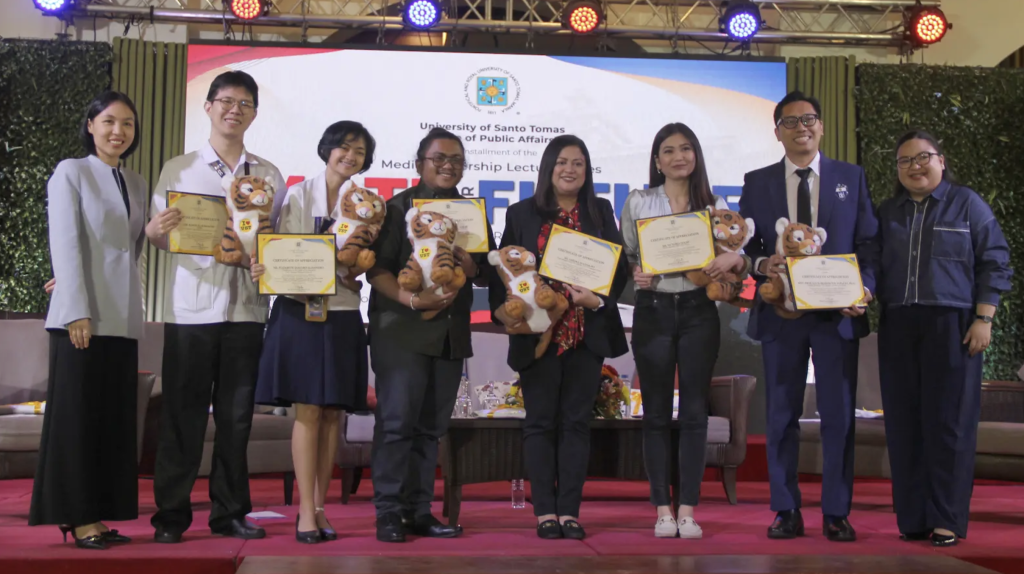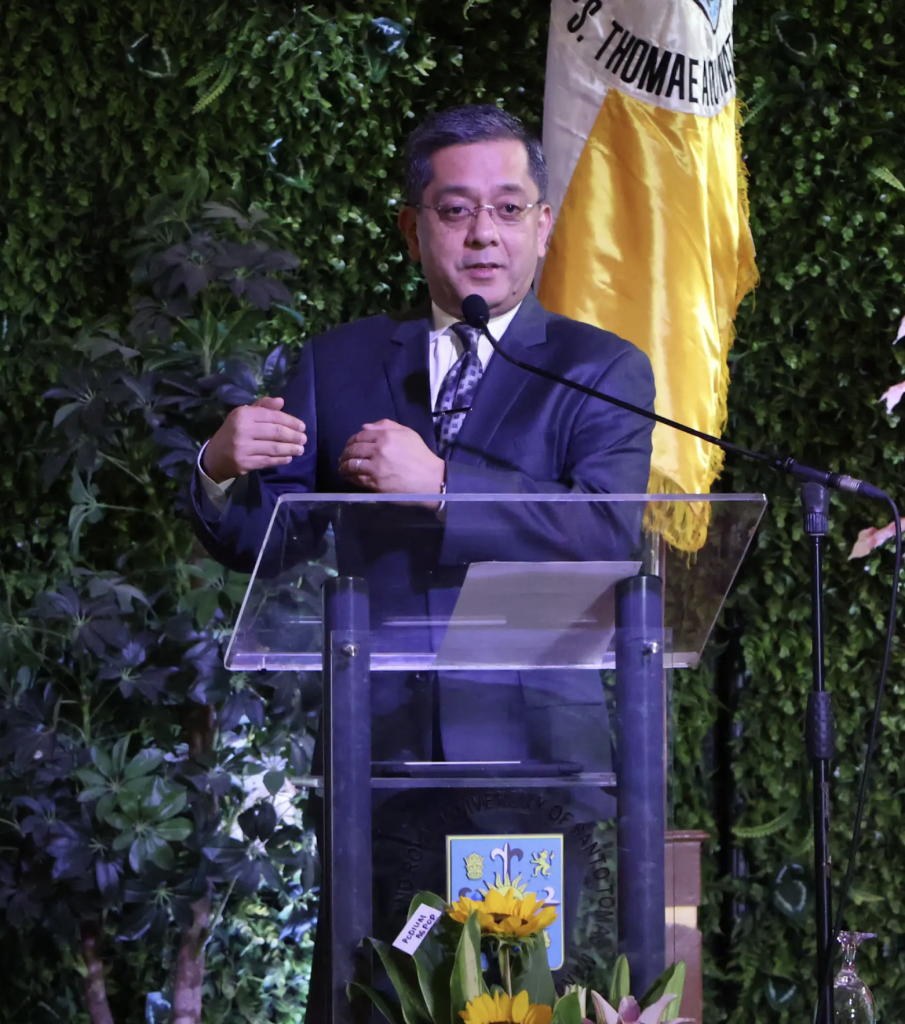The University of Santo Tomas (UST), through the Office of Public Affairs (OPA), hosted its 7th installment of the Media Leadership Lecture Series (MLLS), focusing on voter empowerment and education. Titled “Our Vote, Our Future: An Exploration of the Shared Role of the Academe, Media, and Government for an Empowered Electorate,” the event was held at the Dr. Robert C. Sy Grand Ballroom in the Bl. Buenaventura Garcia Paredes, O.P., building on April 3, 2025.


The lecture series involved experts in the field of election law and journalism — speakers such as the Commission on Elections (COMELEC) Chair Hon. George Erwin Garcia, Manila Bulletin Publisher Sec. Herminio “Sonny” Coloma, Jr., and panelists GMA Integrated News Senior Reporter Ms. Sandra Aguinaldo, ABS-CBN Senior Reporter Ms. Victoria Tulad, and TV5 Digital Growth Editor for News Mr. John Reczon Calay.
In his talk, Hon. Garcia encouraged the Thomasian community to combat misinformation and make more informed votes in the upcoming elections. Hon. Garcia firmly believes that it is the COMELEC’s responsibility to inform Filipino citizens of election-related issues and concerns; he recalled an incident regarding a person’s lack of knowledge about the COMELEC which resulted in an informative tour within the commission’s office.
Hon. Garcia also highlighted that one of the ways to improve information dissemination is through partnering with schools and universities for voter education. The lecture series, according to Hon. Garcia, is an “opportunity… for us to encourage you [students]… to vote,” as a shared goal of the academe and the COMELEC during election season. “Voters’ education is the key to the problems of this country,” he said in light of the ongoing national concern of information disorder, especially in social media. He also underscored the value of caution in the use of social media as a source of news despite its validity as a new medium for procuring information.
Hon. Garcia expressed his hope towards the current generation of voters near the end of his piece, telling the audience, “the future is in their hands,” reiterating his stance on researching candidates to make informed votes in the upcoming elections.
Concerns such as the involvement of voters in elections and journalistic practice during the election season echoed in the panel discussion with journalists from different broadcasting networks, joined by Faculty of Arts and Letters Faculty Secretary Asst. Prof. Louie Benedict R. Ignacio, Ph.D., and student leaders Mr. Ramon Ellis Francisco and Ms. Elizabeth Alejandro from the College of Science and the Faculty of Arts and Letters, respectively; the discussion was moderated by OPA Assistant Director Ms. Katherine Patrice B. Sibug.
The panel discussion commenced with a question on the state of each person’s respective offices during elections; commonly mentioned was the hectic nature of the panelists’ workplaces. Calay added that the opportunity to cover elections or any national event is considered a milestone for a journalist, resulting in lively newsrooms during such days.
In relation to the academe, Ms. Sibug raised the question of whether timely election-related content is integrated into discussions; Ignacio stated that the use of current events are most useful in the social sciences, giving students better understanding of the theories discussed in class. Alejandro added that the central student council (CSC) has been making efforts to educate the Thomasian voters on national and local elections, in collaboration with the COMELEC.
In light of modern media, news outfits have also adapted to using social media for news updates since students and other younger audiences rely more on the internet to obtain information; voter education has now also adapted to online platforms to sustain coverage for a wider audience. Social media as a source of information for class discussions is then seen as “both an advantage and a risk,” according to Ignacio, because of the variety of content one can be exposed to and influenced, whether verified or not.
Due to the ongoing concern of fake news and biased information, Ms. Sibug raised the question of how journalists face the challenge of balancing unbiased truths among the sea of unregulated, biased content. Panelists agreed that persistence in spreading well-researched and unbiased news is the most important method of combating misinformation: “arm yourself with the truth, so when people question you, you have ammunition,” in Tulad’s words.
“There may be noise, pero malaki ang espasyo natin para magbalita (but we have a wider space to deliver news)…” said Calay on addressing fake news in social media, using biased comments as an opportunity to correct information.
On the one hand, to aid in educating and informing those in the academe, Francisco mentioned the creation of guides for student organization public relations officers in creating and organizing content for the student body, where voter education materials may be distributed between organizations in varying forms of content for easier digestion. On the other hand, fact-checking is under the responsibility of the CSC’s research and publication committee, ensuring that all content would undergo multiple levels of scrutiny, from students up to their advisers.
To conclude their discussion, the panelists shared their thoughts on the collaborative process of voter education, through the partnerships between the University and media outfits and personal research rather than getting absorbed in one’s algorithm.
To end the series of talks for the event, Sec. Coloma introduced the Manila Bulletin “Matalinong Boto” Campaign, advocating for safe, fair, and honest elections. He delved into topics such as engaging in respectful discourse between peers, avoiding smear campaigns among candidates, and ensuring that information shared is truthful and researched. Afterwards, students took the pledge towards Matalinong Boto, in reflection of St. Thomas Aquinas’ teachings on Veritas (truth), as all truths come from God and correspond to reality.
Overall, the 7th MLLS has given students the opportunity to gain insights from specialists and fellow Thomasians on becoming more informed and responsible citizens during the elections.
Previous MLLS installments touched on topics including but not limited to information disorder, health communications, media in evangelization, among many others.


